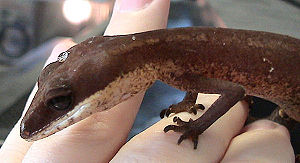Cat gecko
| Cat gecko | ||||||||||||
|---|---|---|---|---|---|---|---|---|---|---|---|---|

Cat gecko ( Aeluroscalabotes felinus ) |
||||||||||||
| Systematics | ||||||||||||
|
||||||||||||
| Scientific name of the genus | ||||||||||||
| Aeluroscalabotes | ||||||||||||
| Boulenger , 1885 | ||||||||||||
| Scientific name of the species | ||||||||||||
| Aeluroscalabotes felinus | ||||||||||||
| ( Günther , 1864) |
The cat gecko , also fox-faced lidcko ( Aeluroscalabotes felinus ) is a tree-dwelling (arboreal) species from the family of the lidckos (Eublepharidae).
Cat geckos are found in Indonesia , Malaysia , Singapore and Thailand , where they prefer to inhabit cool, moist, montane rainforests with streams or rivers. They grow up to 18 cm long, with the males being smaller than the females. The top of the body is red-brown with white dots, the chin and sometimes the belly are white. As a member of the Lidgeckos, he lacks the typical adhesive pads on his fingers for geckos, but as adaptations to their arboreal way of life, they use their tail as a grasping organ and can oppose their claws. Cat geckos mainly feed on small arthropods .
The animals are taken into the terrarium in the wild from time to time , whereby most of the individuals die during transport. In Thailand there is a law that prohibits the catch, trade, import and export of cat geckos.
The nominate form A. felinus felinus was described by Günther in 1864, the first description of the subspecies A. felinus multituberculatus was in 1927 by Kopstein.
Web links
swell
- Thomas Ulber: Leopard geckos in the terrarium. Bede-Verlag, Ruhmannsfelden 1995, ISBN 3-927997-81-1 (small part about cat gecko).
